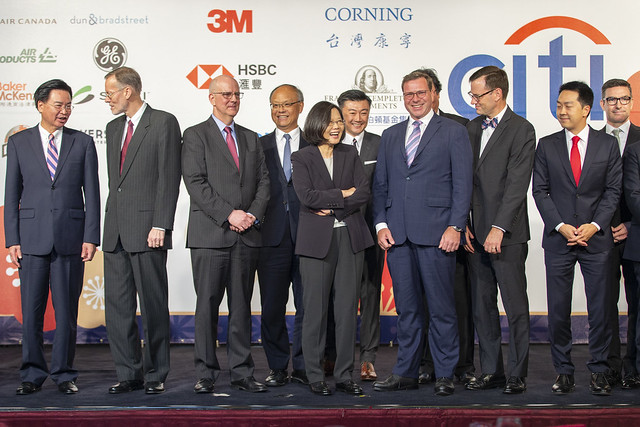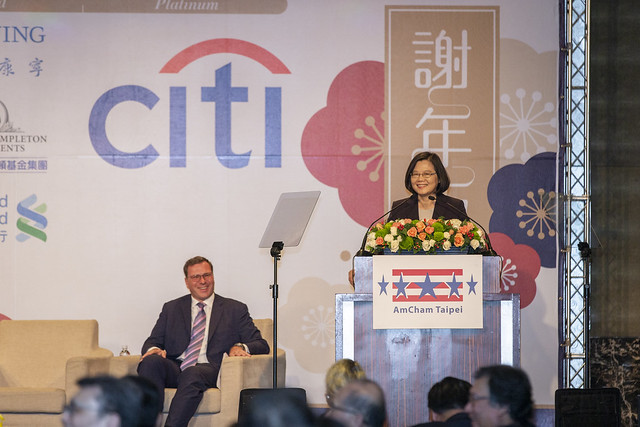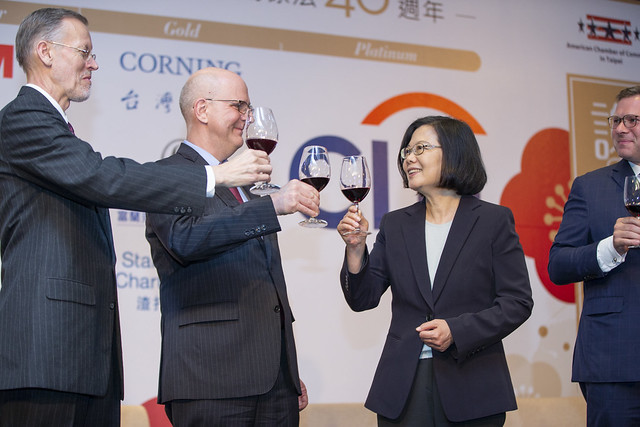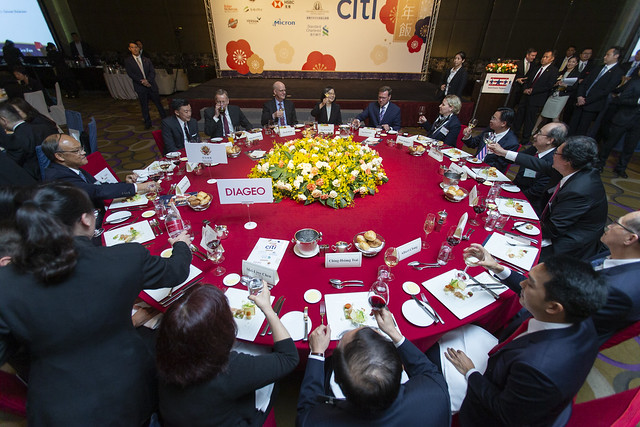News & activities
 News releases
News releases
President Tsai Ing-wen attended the 2019 Hsieh Nien Fan business dinner held by the American Chamber of Commerce in Taipei (AmCham) on the evening of April 10.
A transcript of the president's remarks follows:
Good evening, everybody. It's great to be back at the American Chamber of Commerce again this year for Hsieh Nien Fan. Year after year, we have a great deal to be thankful for – from persistently strong economic growth, to more profits for you and your companies.
I want to offer a special greeting to Leo Seewald, AmCham's new chairman. I am particularly pleased that under his leadership, BlackRock last year made its first investment in renewable energy in Taiwan. If the world's largest money manager invests in our renewable energy sector here, then I trust our efforts must be on the right track.
I want to thank Bill [Wiseman] for another year well done. AmCham is achieving more items from their annual White Paper than ever before. I'll let Bill and his team take the credit for that. I know you'll continue to build on AmCham's success, year after year.
My good friend [AIT] Director [William Brent] Christensen is also here. He, too, knows a thing or two about building construction. You see, they have been trying to beat the record for the longest-running construction site in Taiwan.
I'm glad that it finally seems to be over. And that we're about to celebrate AIT's housewarming in a few days.
We also have a special visitor from Washington, DC, Deputy Assistant Secretary David Meale. His portfolio is Trade Policy and Negotiations, which sounds pretty similar to my portfolio 20 years ago. So he and I will have a lot to talk about. And I am not sure that the conversation will end until we can move forward on all the trade issues we've been discussing for the past three years.
I always like coming to AmCham because it's a good crowd, an optimistic and engaging crowd.
Well, ladies and gentlemen: This year will be also a good year, an optimistic, and engaging year.
Despite challenges in the global economy, our GDP growth will continue to exceed 2%, consistent with other developed economies in the region. This comes after another strong year, where our economic performance continued to exceed expectations.
Salaries have continued to increase. January capped off 14 straight months of growth above 2% on an annualized basis.
We have added another 76,000 jobs over the past 12 months, and the unemployment rate remains at record lows.
In fact, over the past three years, many jobs have been created by big tech giants like Google, Amazon, Microsoft, Micron, and Facebook, because they see the potential and quality of our talent.
This afternoon I just visited Facebook's new office in Taipei, and was pleased to learn that they are planning to train 50,000 digital marketers.
Investments are also flowing in from around the world. In the first two months of this year, we have seen 554 new cases, a 10% year-on-year increase, focusing on small and medium-sized enterprises.
More Taiwanese-owned companies abroad are also bringing new investments back home. As part of an action plan established this year, the government is providing support in the areas of taxation, financing, and land acquisition.
Already, 24 companies have passed review. They're ready to bring a total of NTD$91 billion back to Taiwan, creating over 9,000 jobs. Fifty other companies have also expressed interest.
So we are actually rather excited. Taiwan's economy remains strong. Our spirits are high. And despite what some of you may hear from the media – after all, this is a campaign year – we know that 2019 will be another great year for Taiwan.
Now I want to talk about AmCham's annual White Paper, because if I don't, Bill may ask me to pay for my own dinner.
We have resolved 11 out of 83 recommendations from the latest White Paper, a new record. Another 21 items are showing good progress. I'm sure Minister Chen [Mei-ling] (陳美伶) of the National Development Council is following up on all these issues.
AmCham companies have shown that they are very satisfied with the investment climate. Which is good, because that means you will all be making more investments. I hope.
We are making progress in addressing the electricity, labor, and regulatory issues that AmCham members have brought up before, including in your most recent Business Climate Survey.
In terms of electricity supply, in 2017 we had 80 days where our reserve capacity dipped below 6%. Last year, that reduced to 29 days.
And we will do even better this year, as more clean and renewable energy sources come online.
We're continuing to reduce burdensome regulations for professionals, managers, and innovators, aiming to provide more flexibility in terms of working hours and responsibilities.
On the regulatory side, it has been three years since we increased the comment period to 60 days, which AmCham requested in the past.
Over 70% of all regulations now fall under this comment period. We also continue to seek ways to reduce unnecessary regulations, while increasing transparency and accountability.
So, as you can see, we take your concerns seriously. We are on the right path. We are building momentum. And we are showing results. For all of you, and for the people of Taiwan.
There are people who say we need a new economic direction. Others may think accepting economic incentives from an authoritarian government is the way to economic progress. Well, again, it's a campaign year – and we're only going to see and hear more of this. But that's not the future we want.
We want a future where Taiwan is strong—but on our own terms, based on our own values and interests. We're not asking for handouts. We want investments that are sustainable; and we want to sell things in a way that doesn't compromise our democracy or way of life. And as you all know, it's just like running a business: There is no shortcut or quick fix for this. It requires hard work. It requires dedication. And that is the direction I am committed to.
Now obviously, there are still factors outside Taiwan's control.
The United States is focused on its current trade negotiations with China. We understand how important it is to achieve a positive outcome, not only because it's a trade relationship that impacts the entire global market, but also because over half of Taiwan's exports go to the United States and China.
So we support the process, and hope the two sides can reach an agreement that takes into account the US concerns about intellectual property rights, and forced technology transfer, while avoiding any long-term impact on the world economy.
There are also some risks that will be more pronounced in 2019 than in the past. Some of these are economic, including volatility in the global stock market, and a protracted slowdown in China. And some others are in terms of security, as we face growing threats from expansionist powers, both in the region, and beyond.
These are all legitimate concerns. It's our responsibility to be better prepared given the current global environment. We want to make sure Taiwan's economic and security position remains on the right track.
In order to do this, we have to enhance our own security needs. That means making our economy more diverse and resilient, and protecting ourselves from new sophisticated threats coming from across the Strait.
Now, with this in mind, I have several priorities.
First, I aim to strengthen our economic ties with the United States. Now, all of you know better than anybody that this is a mutually beneficial relationship. Taiwan plays a critical role in the global supply chain. We build goods for US companies to sell – and we do it better than anyone else.
As we have expressed on a number of occasions, we see great value in pursuing a bilateral trade agreement with the US, creating a potential model for the rest of the region. That commitment hasn't changed.
What the current administration in the US has shown is that it can be creative in dealing with trade issues. And certainly, if they apply that to Taiwan, they will find a ready and willing partner.
On this topic, we are communicating well in Washington, DC, where there is growing appreciation for the strategic importance of Taiwan, particularly in the trade area. And this applies to Taipei as well. We have continued to welcome a number of senior officials from the United States, including Deputy Assistant Secretary Meale, for engagement on economic issues.
I know that AmCham members have been outspoken on this issue. And I hope this continues. Because it will take a concerted effort from all of us to see it through.
We will also strengthen Taiwan's ability to respond to traditional and non-traditional security threats.
I noticed that the Business Climate Survey reflects many of your concerns about China's pressure campaign and security threats towards Taiwan.
Our commitment has been clear since day one. We will continue to be pragmatic, while maintaining the status quo and being a responsible stakeholder. Taiwan will be a proactive contributor to peace in the region. This will never change.
And we must get ready to rise up to these challenges, not alone, but together with other democratic states, including the United States.
It is true that despite our best efforts, we are still faced with growing challenges. And I am committed to addressing these challenges, whether it's by enhancing our deterrence capabilities, building up our defense industries, or increasing our military morale.
But I want to emphasize that we are not facing these trials alone. We stand together in a community of like-minded states that have been ever more forceful and committed to increasing Taiwan's international space, as well as our democracy, free market, and way of life. Our strength lies in our collective group of friends and partners around the world.
What we have done is to make sure that our external environment is secure, so that we can continue focusing on the internal reforms that will make our economy more robust, and our businesses more competitive.
This is all reflected in our continued work and engagement with AmCham. This is a relationship that is important to us, and we will continue to work hand-in-hand to find ways to bring more jobs and investment to Taiwan. So you have me as your partner, and many other partners throughout the Taiwan government.
So, I do have quite a number of members of the cabinet here, would you stand up? Well, less than I thought it is. But to compensate for that, we do have the Mayor of Taoyuan City [Cheng Wen-Tsan, 鄭文燦] here today. As you can see, he is young and rather substantial, and we do have someone from the Legislature Ker Chien-Ming (柯建銘). I think he is a powerful negotiator; he can negotiate everything and anything for you.
Finally, I look forward to a successful evening, and another successful year ahead! Thank you.












